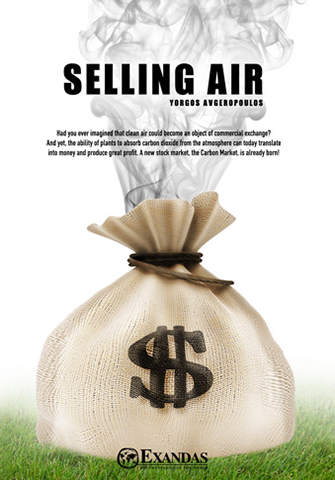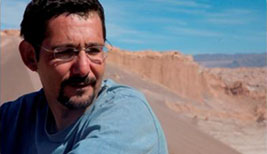
Selling Air
Dir: Yorgos AvgeropoulosHad you ever imagined that clean air could become an object of commercial exchange? And yet, the ability of plants to absorb carbon dioxide from the atmosphere can today translate into money and produce great profit. A new stock market, the Carbon Market, is already born!
Watch the Film Now!
Choose the language you prefer and stream the film in Full HD from any digital device. Enjoy your private screening!
Buy the DVD
Public Screening
Are you interested in organizing a public screening of our film? Send us an email with your inquiry and we will be glad to assist you!
Educational / Library Use
Are you interested in enriching the library of your institution with our film? Contact us and let's create together an informed public!
- DURATION: 48min
- AVAILABLE IN THE FOLLOWING LANGUAGES: English | Greek
- AVAILABLE VERSIONS: English (48min) | Greek (48min)
- YEAR OF PRODUCTION: 2010
- Written & Directed by: Yorgos Avgeropoulos
- Produced by: Nina – Maria Paschalidou, Georgia Anagnou
- Director of Photography: Yiannis Avgeropoulos
- Production Manager: Anastasia Skoubri
- Research Coordinator: Aggelos Athanasopoulos
- Editing: Yiannis Biliris, Anna Prokou
- Original Music by: Yiannis Paxevanis
PRODUCTION NOTES
Ken Newcomb was amongst the first to invest in carbon dioxide units, and he recalls the first reactions: “How can you create an asset that can be traded out of something you can’t smell, touch or feel? It was hard to get your head around!” The Carbon Market is now developing rapidly. From 400 million dollars in 2004, it has reached a size of 127 billion USD in 2009. According to expert estimates, it could be as high as 3 trillion by the year 2020!
This mechanism was provided by the Kyoto Protocol, when measures to face climate change were already urgently needed. For, as all reliable scientists stress, if we wish to continue to live on this planet, we must drastically reduce greenhouse gas emissions until the year 2050. Carbon dioxide is, of course, one of them.
The Markets provided the solution: If the protection of the environment can be turned into a business, then maybe the planet still stands a chance! “Universally, for good or for bad, people are motivated by profit!” says Glenn Hurowitz, one of the researchers for “Avoided Deforestation Partners”, an organization which promotes this policy in the USA. Europe is already the great leader of this Market.
Entire countries, companies, investors, brokers and speculators buy and sell units of carbon Fougaradioxide in the stock markets of London and Chicago, just as they would do with rice, oil, wheat or gold. Those who do not exhaust the permitted levels of gas emissions sell to whoever exceeds them. In June 2010, the price of one unit, that is 1 ton of carbon dioxide, was approximately 15 euro. As, according to the plan, the allowed limit of gas emission will continually decrease, the price will be going up. Gradually, always according to the logic of this mechanism, “green” or “clean” investments will be the only profitable solution for industries. However, can this logic really save the planet?
American Electric Power, the American electricity company, is the emperor of coal in the USA, and one of the world’s most polluting industries. Its president, Michael Morris, supports the operation of the Coal Market. “To say we have the sun and wind, and with them we will replace everything we do, is a terrible argument. We will continue to burn coal in the entire world, we simply all need to do it in the most environmentally responsible way that we can”, he claims.
So, American Electric Power, along with Chevron and General Motors, gave 18,000,000 dollars for 18,600 hectares of jungle in Brazil’s Atlantic Forest. And, contrary to what one would expect, they invested in the forest in order to protect it! “As these trees are evaluated according to the coal they store, they are suddenly more valuable alive than dead”, Glenn Hurowitz explains.
It is estimated that, during the 40 years that the three companies will be exploiting this Atlantic Forest area, the trees existing in it will absorb approximately 384,264 tons of carbon dioxide. This quantity belongs to the companies, who thus counterbalance their own polluting emissions.
However, the small community living beside one of AEP’s biggest plants, in the Appalachia Store Jackson Drive Mountains, will hardly be benefited. Mr. Larry Gibson tells us that approximately 300 of his family members are buried in the village’s cemetery. “The biggest killer here is cancer. You don’t hear no birds in my place. The worst air that’s ever been tested was up here!” he tells us.
According to the American Cancer Society, the area surrounding the plant is number one in deaths by lung cancer and number two in deaths by all cancers combined. “Apart from that, since 1993 as of now, we’ve lost 483 men from fatalities in the mine, and the industry and the government keeps making reference to this type of energy as ‘cheap’ “, Mr. Gibson says tauntingly.
The investments of American Electric Power in the jungles of Brazil are known to the area’s inhabitants. “They’re just shuffling the deck and pretending to do something about it”, Elisa Young, a dweller of the area, angrily refutes. “We have not seen a reduction in the polluting as a result of that regulation. What we saw was an increase, if you look at what we’re actually breathing”.
On the other side, when in the year 2000 the Brazilian non-governmental organization SPVS began to buy large areas of the Atlantic Forest with money provided by big companies, the small indigenous communities which are spread out in the forest and live from it saw this development with a keen eye. Ten years later, the situation is so dramatic for the area’s poor inhabitants that they do not even have access to the natural resources that exist on their own land!
“We can’t even fish in the river!” Mr. Mesias Franco tells us. “At one time they enforced a special plan to evacuate the fishermen from the river banks. How can one survive? You go and cut wood and the police come and arrest you because the area is now private. If I want to cut a palmito to cook and eat I must do it secretly, like a thief, because it now belongs to them!
There’s nothing left to do in the fields. You don’t have the right to work for yourself. You end up in a kind of slavery.
The area’s dwellers now live with the fear of the Environmental Police, the well-known “Green Police Force”, which patrols the area. “The Green Patrol is a group that only protects private property and the crimes committed here”, says Jonas De Souza, a farmer and activist of the Landless Peasant Movement (Sem Terra). “When the people of Brazil are not allowed access to natural resources because they no longer belong to them but to a foreign company that controls them all, how do you call that? That is, naturally, colonization!”
The question inevitably arises: with Markets having led the planet to the border of catastrophe, can we now trust them to save it? Kate Horner, from the organization Friends of the Earth, is categorical: “What we need to do is use policies to ensure that those who are polluting reduce their emissions. Period. And what carbon trading does is it makes it a lot easier for those who are polluting to continue polluting!”







